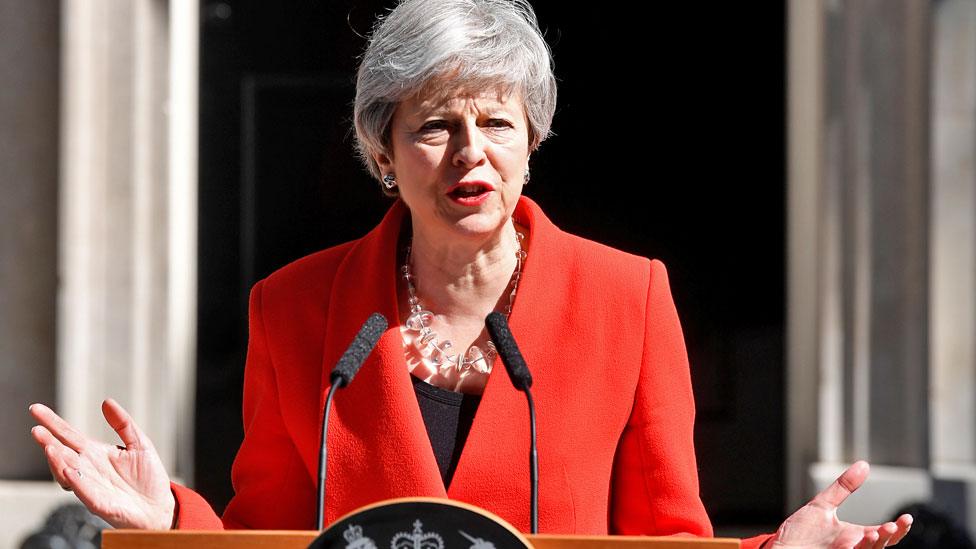Theresa May: What does PM's departure mean for NI?
- Published
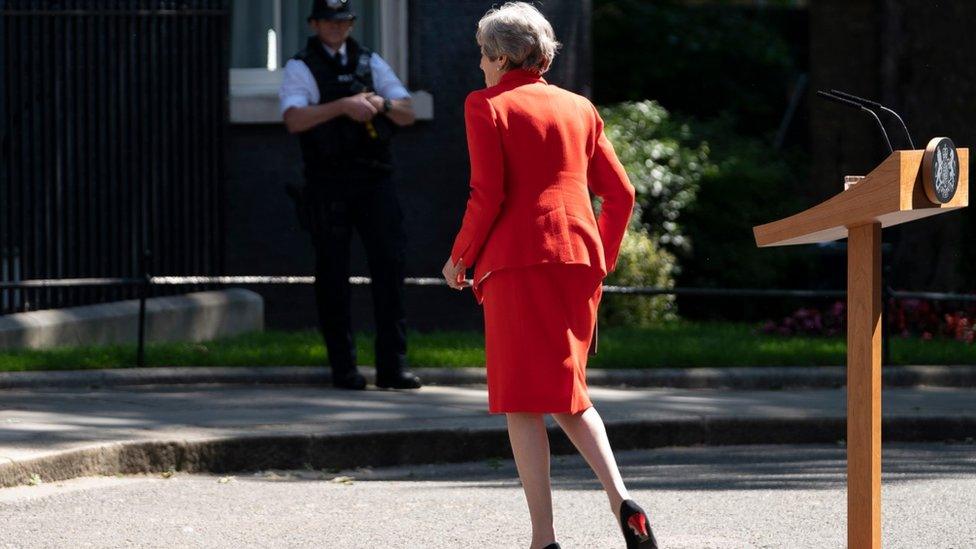
Theresa May's announcement that she will quit as Conservative leader on 7 June paves the way for a contest to decide a new prime minister.
She had been facing intense pressure to quit after MPs across Parliament said they would not back her Brexit deal.
Opposition to it focused on the Irish border backstop. Mrs May had also recently supported fresh power-sharing talks in Northern Ireland.
So what will her departure from Downing Street mean for Northern Ireland?
Brexit and the border
The prime minister said the failure to deliver Brexit was a matter of "deep regret"
Most of Theresa May's time in office centred on negotiating the UK's exit from the EU.
The biggest difficulty she faced in navigating that was resolving the Irish border issue - not reaching an agreement with the EU until November 2018.
Her government signed up to the backstop, the insurance policy to maintain an open Irish border unless and until another solution could be found.
It immediately faced a backlash from the Democratic Unionist Party (DUP) MPs, and in the months that followed she tried to build up support for her deal by promising changes to the backstop and vowing it would never come into effect.
Her critics said she had allowed the EU to act with "intransigence" when it came to Northern Ireland, and said because she had voted remain in the EU referendum, she was never really committed to delivering Brexit.
Ardent Brexiteers in the Conservative Party will be hoping they can now negotiate a different deal - but that idea has already been swiftly dismissed.
Irish Foreign Minister Simon Coveney moved quickly on Friday to point out that he didn't see the EU offering "any new prime minister a better or very different deal to what was on offer to Theresa May".
Whoever moves into Number 10 next could find themselves facing the same Brexit dead end as Mrs May did.
That means more questions about the possibility of another extension to the current 31 October deadline; does a no-deal Brexit appear firmly on the table again, and will a Brexit deal ever get through Parliament?
What about the DUP-Conservative deal?
After Theresa May failed to get a majority in the snap general election in June 2017, she needed allies in order to form a government.
The DUP had just managed their best ever Westminster result, returning 10 MPs.
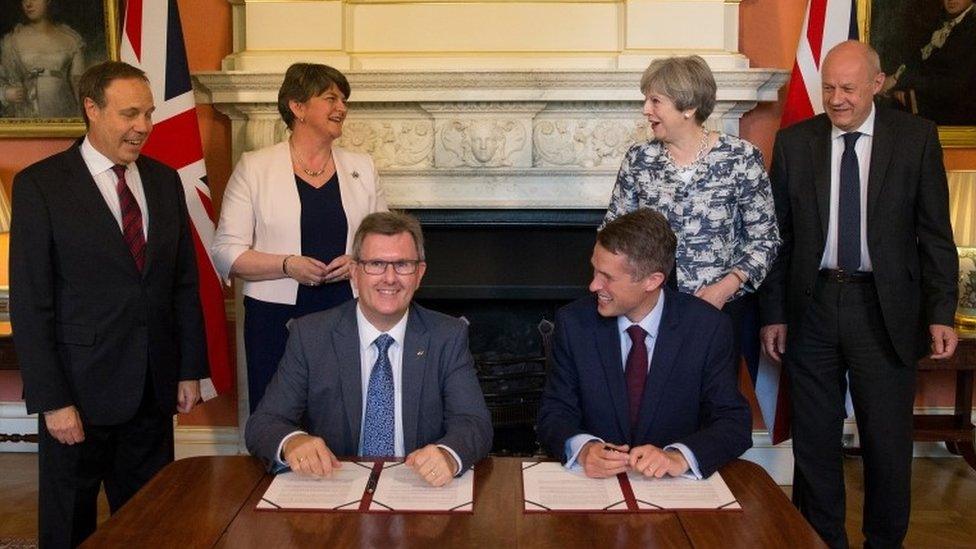
The DUP has always said its agreement is with the Conservative government - not the prime minister
After two weeks of negotiations with the Conservatives, the DUP signed up to a confidence-and-supply arrangement, in exchange for an extra £1bn in spending for Northern Ireland.
That deal is due to expire next month, just after Mrs May hands over the reigns to her successor.
The arrangement has been tested at times over the past year, with the DUP abstaining and even voting against the government in the Commons on occasions to express its displeasure over Brexit - a warning shot to the government about the power the DUP could, at times, wield in Parliament - but it always insisted the deal was still in place.
What happens now? It's not certain yet, but the DUP and the Conservatives will likely re-negotiate the deal in the short-term, in order to give the new prime minister some sort of safety net when he or she takes office.
The DUP has always said it doesn't mind who leads the Tories, but will no doubt hope to see someone at the helm who shares similar views on the Brexit process.
That being said, the party will be wary of political promises from any new prime minister, given it accused Mrs May of breaking so many she made to the DUP during her time as prime minister.
How will Mrs May's exit impact Stormont?
Mrs May is resigning just a few weeks after a new talks process aimed at restoring power-sharing in Northern Ireland began.
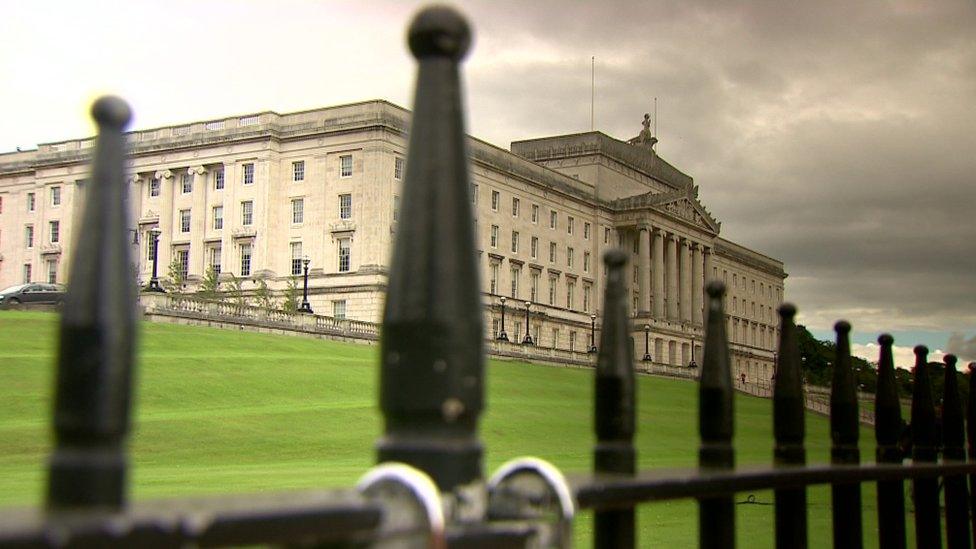
Several rounds of talks since January 2017 have failed to break the Stormont deadlock
The talks were announced after the murder of journalist Lyra McKee by the New IRA in Londonderry - the prime minister was among political leaders who attended the funeral.
Northern Ireland has been without a functioning devolved government since January 2017, after a bitter row between the two biggest parties.
Talks have been relatively low-key so far because of the European election campaign, but Mrs May and the Taoiseach (Irish PM) Leo Varadkar had said they would review progress next week.
There had already been little optimism that the new process would lead to a breakthrough, primarily because the issues that divide the political parties have not changed.
Theresa May's government had also faced accusations of being too hands-off in approaching the Stormont process, because of the link between the DUP and the Conservatives.
Other Stormont parties had repeatedly called for an independent mediator to chair the talks, although the government refused to do so.
Whoever takes over as PM will now have the issue of power-sharing in their in-tray.
But will they bring a fresh pair of eyes to a stale process, or could restoring devolution fall further down the agenda?
When she goes, what happens to Karen Bradley?
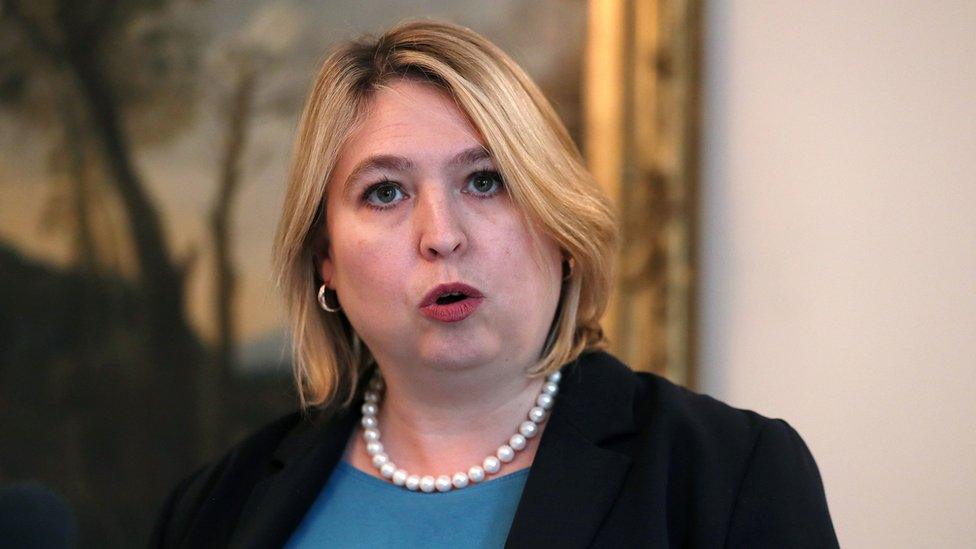
Secretary of State Karen Bradley has come under repeated criticism for appearing reluctant to take decisions about Northern Ireland
When a prime minister leaves office, so too does the entirety of their cabinet and the new office-holder picks their own team - which means we are likely to shortly see a new Northern Ireland secretary.
Karen Bradley is known for being a friend of Theresa May, and a loyalist to the prime minister, one of few cabinet ministers who steadfastly supported the Brexit withdrawal deal.
She was moved to the Northern Ireland Office in January 2018, when James Brokenshire resigned for health reasons.
But throughout her time in the role, she has come under repeated criticism for appearing reluctant to take decisions for Northern Ireland in the absence of an executive.
She is currently facing pressure for refusing to take legislation through Westminster to compensate victims of Historical Institutional Abuse (HIA), and has made several comments demonstrating a lack of understanding about Northern Ireland, which have lead to calls for her to resign.
The political parties might welcome a new Northern Ireland secretary, but the arms-length stance recent holders of the role have taken towards Stormont may not give the parties much to be optimistic about.
- Published24 May 2019

- Published24 May 2019
